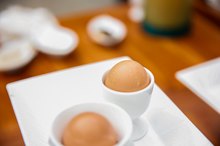What does fact checked mean?
At Healthfully, we strive to deliver objective content that is accurate and up-to-date. Our team periodically reviews articles in order to ensure content quality. The sources cited below consist of evidence from peer-reviewed journals, prominent medical organizations, academic associations, and government data.
The information contained on this site is for informational purposes only, and should not be used as a substitute for the advice of a professional health care provider. Please check with the appropriate physician regarding health questions and concerns. Although we strive to deliver accurate and up-to-date information, no guarantee to that effect is made.
Eggs and Blood Pressure
High blood pressure, or hypertension, increases your risk for heart disease, stroke and kidney disease. Eggs can be part of a heart-healthy diet to control your blood pressure. You derive the most benefit from eggs when you eat them with other nutritious foods. Continue to work with your doctor to make sure that your blood pressure is under control.
DASH Diet
When you design a diet for achieving or maintaining normal blood pressure, it may be helpful to base it on the Dietary Approaches to Stop Hypertension, or DASH, diet. This dietary pattern may lower blood pressure in individuals with hypertension, and it provides recommendations for the number of servings that you should have from each food group, according to the 2010 Dietary Guidelines for Americans 1. If you are on a 2,000-calorie diet, you should have up to 6 ounces per day of foods with lean protein, such as eggs or egg whites.
Sodium Recommendations
The Best Vegetables & Fruits to Eat for High Blood Pressure
Learn More
A large egg has 71 milligrams of sodium, so it can fit into a low-sodium diet to control your blood pressure. Healthy adults should have no more than 2,300 milligrams per day, and individuals with high blood pressure should have no more than 1,500 milligrams, according to the 2010 Dietary Guidelines for Americans. To limit your sodium intake, flavor your eggs with herbs and spices instead of adding salt at the table or during cooking.
- A large egg has 71 milligrams of sodium, so it can fit into a low-sodium diet to control your blood pressure.
Weight Control
Eggs can be healthy for your blood pressure if you use them to control your calories and maintain a normal weight or lose weight if you are overweight. Obesity can raise your blood pressure or make it difficult for you to lower high blood pressure. A large egg has 73 calories and an egg white has only 17 calories, so eggs can be part of a calorie-controlled diet to lose or maintain weight. An egg or egg white has 6 grams of protein, which is a filling nutrient to help you lose weight, according to the Harvard School of Public Health 2.
- Eggs can be healthy for your blood pressure if you use them to control your calories and maintain a normal weight or lose weight if you are overweight.
- A large egg has 73 calories and an egg white has only 17 calories, so eggs can be part of a calorie-controlled diet to lose or maintain weight.
Fitting Eggs into Your Healthy Diet
The Average Weight & Height for a 13-Year-Old
Learn More
You can eat your eggs with nutrient-dense foods to increase your intake of nutrients that are necessary for maintaining a healthy blood pressure. For example, a breakfast consisting of scrambled eggs with low-fat cheese, or hard-boiled eggs with fortified breakfast cereal, provides calcium, which is essential for your blood pressure, according to the Linus Pauling Institute. Fruits and vegetables are good for your blood pressure because they naturally low in sodium and high in potassium.
Related Articles
References
Writer Bio
Natalie Stein specializes in weight loss and sports nutrition. She is based in Los Angeles and is an assistant professor with the Program for Public Health at Michigan State University. Stein holds a master of science degree in nutrition and a master of public health degree from Michigan State University.









